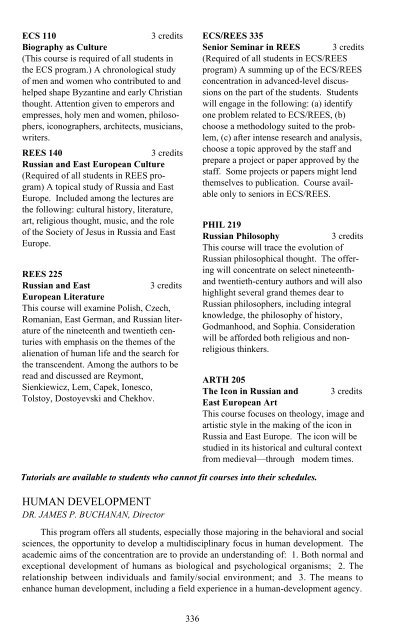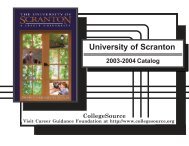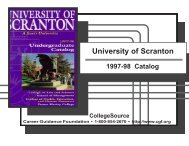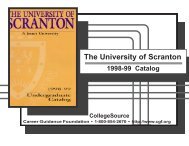1999-2000 - The University of Scranton
1999-2000 - The University of Scranton
1999-2000 - The University of Scranton
Create successful ePaper yourself
Turn your PDF publications into a flip-book with our unique Google optimized e-Paper software.
ECS 110 3 credits<br />
Biography as Culture<br />
(This course is required <strong>of</strong> all students in<br />
the ECS program.) A chronological study<br />
<strong>of</strong> men and women who contributed to and<br />
helped shape Byzantine and early Christian<br />
thought. Attention given to emperors and<br />
empresses, holy men and women, philosophers,<br />
iconographers, architects, musicians,<br />
writers.<br />
REES 140 3 credits<br />
Russian and East European Culture<br />
(Required <strong>of</strong> all students in REES program)<br />
A topical study <strong>of</strong> Russia and East<br />
Europe. Included among the lectures are<br />
the following: cultural history, literature,<br />
art, religious thought, music, and the role<br />
<strong>of</strong> the Society <strong>of</strong> Jesus in Russia and East<br />
Europe.<br />
REES 225<br />
Russian and East 3 credits<br />
European Literature<br />
This course will examine Polish, Czech,<br />
Romanian, East German, and Russian literature<br />
<strong>of</strong> the nineteenth and twentieth centuries<br />
with emphasis on the themes <strong>of</strong> the<br />
alienation <strong>of</strong> human life and the search for<br />
the transcendent. Among the authors to be<br />
read and discussed are Reymont,<br />
Sienkiewicz, Lem, Capek, Ionesco,<br />
Tolstoy, Dostoyevski and Chekhov.<br />
Tutorials are available to students who cannot fit courses into their schedules.<br />
HUMAN DEVELOPMENT<br />
DR. JAMES P. BUCHANAN, Director<br />
336<br />
ECS/REES 335<br />
Senior Seminar in REES 3 credits<br />
(Required <strong>of</strong> all students in ECS/REES<br />
program) A summing up <strong>of</strong> the ECS/REES<br />
concentration in advanced-level discussions<br />
on the part <strong>of</strong> the students. Students<br />
will engage in the following: (a) identify<br />
one problem related to ECS/REES, (b)<br />
choose a methodology suited to the problem,<br />
(c) after intense research and analysis,<br />
choose a topic approved by the staff and<br />
prepare a project or paper approved by the<br />
staff. Some projects or papers might lend<br />
themselves to publication. Course available<br />
only to seniors in ECS/REES.<br />
PHIL 219<br />
Russian Philosophy 3 credits<br />
This course will trace the evolution <strong>of</strong><br />
Russian philosophical thought. <strong>The</strong> <strong>of</strong>fering<br />
will concentrate on select nineteenthand<br />
twentieth-century authors and will also<br />
highlight several grand themes dear to<br />
Russian philosophers, including integral<br />
knowledge, the philosophy <strong>of</strong> history,<br />
Godmanhood, and Sophia. Consideration<br />
will be afforded both religious and nonreligious<br />
thinkers.<br />
ARTH 205<br />
<strong>The</strong> Icon in Russian and 3 credits<br />
East European Art<br />
This course focuses on theology, image and<br />
artistic style in the making <strong>of</strong> the icon in<br />
Russia and East Europe. <strong>The</strong> icon will be<br />
studied in its historical and cultural context<br />
from medieval—through modem times.<br />
This program <strong>of</strong>fers all students, especially those majoring in the behavioral and social<br />
sciences, the opportunity to develop a multidisciplinary focus in human development. <strong>The</strong><br />
academic aims <strong>of</strong> the concentration are to provide an understanding <strong>of</strong>: 1. Both normal and<br />
exceptional development <strong>of</strong> humans as biological and psychological organisms; 2. <strong>The</strong><br />
relationship between individuals and family/social environment; and 3. <strong>The</strong> means to<br />
enhance human development, including a field experience in a human-development agency.
















